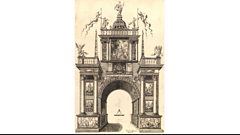18. London Becomes Rome
Neil MacGregor surveys the triumphal arches created for James I's entry into London in 1604. From May 2012
A set of designs for the Coronation Procession of James I reveals the extent of classical knowledge amongst Shakespeare's audience.
Object-based history series presented by Neil MacGregor, former Director of the British Museum.
Taking artefacts from William Shakespeare's time, he explores how Elizabethan and Jacobean playgoers made sense of the unstable and rapidly changing world in which they lived.
With old certainties shifting around them, in a time of political and religious unrest and economic expansion, Neil asks what the plays would have meant to the public when they were first performed.
He uses carefully selected objects to explore the great issues of the day that preoccupied the public and helped shape the works, and he considers what they can reveal about the concerns and beliefs of Shakespearean England.
Producer: Paul Kobrak
First broadcast on 成人快手 Radio 4 in May 2012.
Last on
More episodes
Previous
London's Triumphal Arches
Date: 1604 听
Size: H:268mm, W:231mm 听
Made in: London 听
Made by: William Kip 听
Material: Paper 听
听
On 15 March 1604, almost a year after he had been crowned, King James I's royal procession made its triumphal way through London. The intervening period had been marked by the great plague of 1603, but now, with the disease abated, the city was safe once again for crowds to gather.
听
And what a sight these crowds would see. Across the City of London, seven towering triumphal arches stood 90 feet above the peering crowds. Each one was highly decorated with adornments representing seven different regions of the world. Combined, these magnificent arches transformed London into ancient Rome, and King James I became its 'conquering Caesar', guaranteeing peace and prosperity.
听
Evidence of these elaborate and remarkable displays of street theatre survives in a book published in 1604 called The Arches of Triumph, a sort of souvenir guide of the day.
听
This object is from the
听
Quotations
'But now behold, In the quick forge and working-house of thought, How London doth pour out her citizens: The Mayor and all his brethren in best sort, Like to the senators of th'antique Rome, With the plebeians swarming at their heels, Go forth and fetch their conquering Caesar in' 听
Henry V, prologue to Act 5
Background
- These arches were built for the royal procession of James I in 1604 (several months after his coronation due to the plague outbreak)
- The procession route was from the Tower of London, through the city, to Temple Bar
- Stephen Harrison, a 'Joyner and Architect' was the man behind the arches' creation, along with his team of over 250 craftsmen
- The arches would have spanned entire London streets - between approximately 40 and 70 feet across
- The passage through which King James I came was 12 feet wide and 18 feet high
More from Radio 4: Julius Caesar

Series of biographical discussions with Matthew Parris. Archaeologist Barry Cunliffe nominates Julius Caesar, a brilliant orator and military tactician.
听
More from Radio 4: Cleopatra

Melvyn Bragg and his guests discuss Cleopatra, the Egyptian pharaoh whose charisma, intelligence and beauty made her one of the most celebrated rulers of the ancient world.
听
More from Radio 4: Paganism in the Renaissance

Melvyn Bragg discusses paganism in the Renaissance and the return of classical pagan thought to Italy and then to the rest of Europe in the 15th century.
听
More from Radio 4: The Greek Myths

Melvyn Bragg discusses the Greek myths from Achilles to Zeus.
听
Broadcasts
- Wed 9 May 2012 13:45成人快手 Radio 4
- Wed 9 May 2012 19:45成人快手 Radio 4
- Wed 31 Oct 2012 14:15成人快手 Radio 4 Extra
- Wed 1 Apr 2015 14:15成人快手 Radio 4 Extra
- Thu 2 Apr 2015 02:15成人快手 Radio 4 Extra
- Wed 3 Aug 2016 13:45成人快手 Radio 4 FM
- Wed 9 May 2018 14:15成人快手 Radio 4 Extra
- Thu 10 May 2018 02:15成人快手 Radio 4 Extra
- Wed 8 Nov 2023 07:15成人快手 Radio 4 Extra
- Wed 8 Nov 2023 12:15成人快手 Radio 4 Extra
- Wed 8 Nov 2023 17:15成人快手 Radio 4 Extra
- Thu 9 Nov 2023 02:15成人快手 Radio 4 Extra
Podcast
-
![]()
Shakespeare's Restless World
Neil MacGregor uncovers the stories 20 objects tell us about Shakespeare's world.



